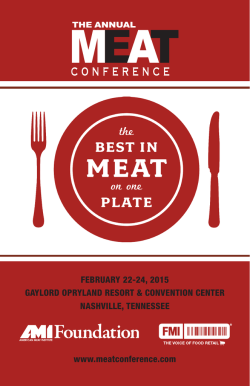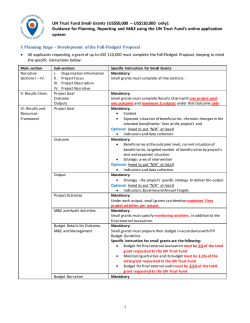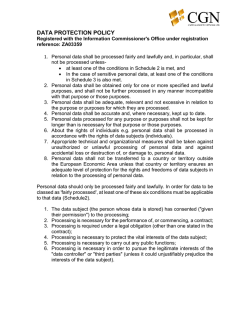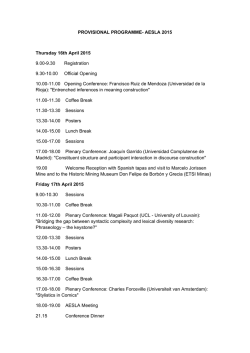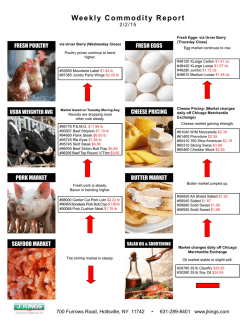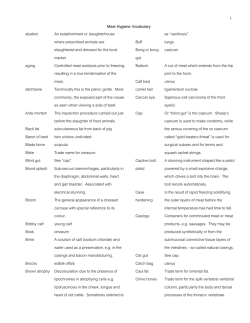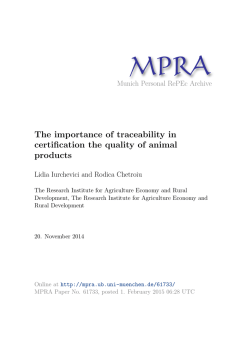
Country of origin labelling for meat in processed foods
At a glance PLENARY – 5 February 2015 Country of origin labelling for meat in processed foods All consumers of processed foods should be able to see where the meat in what they are eating came from. The February plenary session is due to vote on a resolution proposed by the Environment, Public Health and Food Safety Committee calling on the Commission to propose EU legislation to make country of origin labelling compulsory for all meats in processed food. Background According to the motion for resolution all meat used as an ingredient in processed food, like ready-mademeals, should bear country of origin labelling. Such labelling has been required for fresh beef and beef products since January 2002, as a consequence of the bovine spongiform encephalopathy (BSE) crisis. The label has to indicate the place of birth, rearing and slaughter. As of April 2015, fresh or frozen unprocessed meat from pigs, sheep, goats and poultry will also have to bear origin information under Regulation (EU) No 1169/2011 on the provision of food information to consumers. The label has to indicate where the animal was reared and slaughtered, but not where it was born. For minced meat there is a derogation; since it may come from different sources, the label only has to indicate whether the animals were reared and slaughtered in the EU or in non-EU countries. A mix of both can be labelled accordingly, indicating both origins. Feasibility of mandatory labelling of processed meat In December 2013, the European Commission submitted a report examining the feasibility and impacts of mandatory indication of the country of origin of meat used as an ingredient. According to the report, mandatory labelling would have serious impacts, potentially causing significant rises in operating costs for food business operators (of 15-20% up to 50%) and consequently raising consumer prices. The report concluded that even if 90% of consumers consider country-of-origin information to be important, they are not prepared to pay extra: at price increases of less than 10%, the 'willingness to pay' fell by 60-80%. The report considers two other, less costly, options (voluntary labelling and labelling indicating only EU/non-EU origin) and invites Parliament and Council to consider the advantages and disadvantages of the options. Diverging views The ENVI Committee adopted a motion for resolution urging the Commission to follow up its report with legislative proposals to make the indication of origin mandatory for meat in processed foods. It will be voted following discussion with the Commission in plenary. According to the motion, consumer confidence must be restored after recent food scandals, such as the horsemeat scandal of 2013, which shook consumers’ confidence in the food chain when it turned out that horsemeat had been used instead of beef in processed food like burgers and lasagne. Labelling the origin of meat used as an ingredient would help ensure better traceability along the food supply chain and increase diligence when food business operators choose their suppliers and products. The estimated price impacts are also questioned, with the findings of research undertaken by French consumer organisation Que Choisir diverging widely from the Commission’s estimates. Opponents of the resolution, however, observe that mandatory labelling would not prevent fraud. In the horsemeat scandal, for example, the products were labelled as beef although they contained horsemeat. Instead, they argue, mandatory labelling of country of origin would significantly increase production costs and cause too great a burden on the food industry, and in particular on small and medium-sized enterprises that represent 90% of the companies operating in EU meat processing sector. EPRS | European Parliamentary Research Service Author: Tarja Laaninen, Members' Research Service PE 548.972 Disclaimer and Copyright: The content of this document is the sole responsibility of the author and any opinions expressed therein do not necessarily represent the official position of the European Parliament. It is addressed to the Members and staff of the EP for their parliamentary work. Reproduction and translation for non-commercial purposes are authorised, provided the source is acknowledged and the European Parliament is given prior notice and sent a copy. © European Union, 2015. [email protected] – http://www.eprs.ep.parl.union.eu (intranet) – http://www.europarl.europa.eu/thinktank (internet) – http://epthinktank.eu (blog) EN
© Copyright 2026


